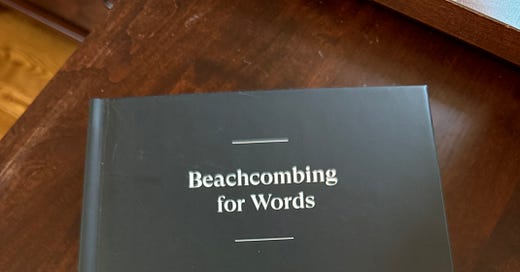A while ago, my sons bought me a Storyworth subscription.
Maybe you’ve heard of Storyworth. The way it works is, every week the service emails the recipient a question about her life, and she writes an answer, in as much detail as she likes, and sends it back. It’s kind of like a memoir in serial or epistolary form. At the end of a year, the questions and answers are compiled into a lovely “black & white interior hardcover book.” Or color for a few extra dollars.
This gift has a lot going for it. It’s something to get your older relative after you’ve already done the digital picture frame and the monthly cheese subscription. It gives Grandma a way to fill those endless empty hours at the home, and your stepdad one more chance to get the last word in. The kids might hope this project will keep parents from telling the same stories over and over out loud. (Ha ha—nope.)
The boys were apprehensive about how their gift might be received. I’m a writer, after all, always on deadline. As my older son said, it seemed like they were giving me another chore to do. Like that time I bought my mom an embroidered quilt “kit” that took her two years to finish.
Me? I was all over Storyworth. I’m a storyteller after all, and a story collector. I used to sit up in the maple tree in my grandma’s back yard so I could hear the uncensored stories told by my relatives on the patio below. The kinds of stories that ended abruptly whenever I walked into the room. My mom was a storyteller, too, but she died young, and I always regretted those stories she never told to me. I’ve done quite a bit of family history research since then, and it’s always the stories—whether in letters, court documents, photographs, and depositions—that bring my ancestors to life.
The service provides some standard questions to prime the pump, like ‘What was your first job?’ ‘What was your neighborhood like growing up?’ ‘Who was your best friend?’ ‘What were your favorite toys as a child?’’ The questions ranged from contemplative (‘What things have mattered most to you in life?’) to binary—‘Did you have a car in high school?’
The gift-giver can also tailor questions to what they know about the writer’s life, to get the inside on family secrets, or collect ammunition for later use. ‘Were you ever fired from a job?’ ‘Who was your least favorite sibling?’ ‘Why did Aunt Betty have to leave town?’ or ‘What was it like in rehab?’
Finally, the memoirist herself can volunteer stories that, in her view, need telling. In that, I had a leg up, because I had begun my writing career writing creative nonfiction--personal essays about parenting, about travel, or because I had an axe to grind. I had a supply of those waiting to be dusted off and included. Many featured my sons growing up. (Back atcha, boys!)
Still, it wasn’t a smooth process. My paid writing gig was kicking my butt. Sometimes weeks went by without story submissions. Questions languished, unanswered. Until finally, a year in, I sent in a flurry of stories and proclaimed it done. I’d submitted 31 stories in all—some short, some very long.
My editor son went to work, readying it for publication. But he ran into a snag.
Son the Elder: I went to preview mom’s Storyworth book yesterday and it threw an error because it was 553 pages long. Storyworth says: Our printer can print books up to 480 pages. In practice, few people run into this limitation.
Me: Hold my beer.
Son the younger: Clearly they never reckoned with Mom!
Me: Don’t forget, there are quite a few photos in there.
Son the Elder: I got it down to a cool 475 pages. Want me to take a look at Bane of Asgard?
Some of you, I know, are thinking, Who the hell wants to read somebody’s 475-page memoir? That’s a fair question. I try to write stories that others will want to read. I like to imagine some great-grandchild who loves story pulling it off a dusty shelf to read about what life was like in the “olden days.” Or maybe a descendant who likes digging up dead relatives. Maybe someone who wants to know what it was like navigating twelve years of social change in a newspaper office, and why writing is like beachcombing for words.
Maybe nobody.
It doesn’t matter. Sometimes the process of writing is the thing—making sense of the past, capturing memories before they fade, choosing the words that tell the truth and putting them down. Sometimes, writing is for the writer, even more than the reader.
Thanks, guys.




AHAHA, I love that you broke Storyworth :) I've always secretly hoped that my kids would get me a Storyworth sub. But considering they haven't read any of the books I've written in over a decade, I'm pretty sure they're not going to do it. But I plan to write some personal essays so that it's there, if they ever decide they want to know more.